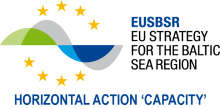A European Union (EU) macro-regional strategy is a policy framework which allows countries located in the same region to jointly tackle and find solutions to problems or to better use the potential they have in common (e.g. pollution, navigability, worldwide business competition, etc.).
Four EU macro-regional strategies, covering several policies, have been adopted so far:
• The EU Strategy for the Baltic Sea Region (2009)
• The EU Strategy for the Danube Region (2010)
• The EU Strategy for the Adriatic and Ionian Region (2014)
• The EU Strategy for the Alpine Region (2015)
All adopted macro-regional strategies are also accompanied by a rolling action plan to be regularly updated in light of new, emerging needs and changing contexts. The four macro-regional strategies concern 19 EU member-states and 8 non-EU countries.
UBC is one of three coordinators, together with the Swedish Institute and Norden Association representing the Baltic Sea NGO Network, of Horizontal Action ‘HA Capacity’ of the EU Strategy for the Baltic Sea Region (EUSBSR). HA Capacity task is to increase the project capacity, skills and competence of all stakeholders involved in the Strategy, through different programmes, capacity building activities, promotion of involvement and participation, networking and joint actions within different flagship initiatives. The other dimension of the Horizontal Action Capacity is to ensure broad participation of local and regional authorities as well as all other stakeholders.
PA EDU / PA TOU / HA CAP INTERREG project
The objectives of HA Capacity have been implemented within the project PA EDU / PA TOU / HA CAP – implementing three work programmes 2018 – 2020 co-funded from the BSR INTERREG Programme. The project is led by Norden Association in Sweden, UBC is a project partner. The total project budget is 755,413.75 EUR.
HA CAP objectives:
The 3 HAC organisations are the Baltic Sea NGO Network in the name of the Norden Association in Sweden, the Swedish Institute and the Union of the Baltic Cities. The main outcomes of the project activities are:
– CAPACITY BUILDING supporting stakeholders to develop skills and competencies to succeed in their respective roles in the implementation of the Action Plan. This project focusses on organizing and funding of development processes (flagships) and the role of Policy Area Focal Points (PAFP)/members of steering groups in aligning policymaking on national level with the EUSBSR.
– PROMOTION OF INVOLVEMENT AND PARTICIPATION. The EUSBSR has created a coherent and structured framework for joint actions to address common challenges and mobilize regional resources in the Baltic Sea Region; many are those who have been given formal roles and responsibilities in accordance with the Action Plan. The long-term viability of the Strategy is nevertheless dependent upon continued efforts to secure the engagement and active involvement also of actors that are not formally charged with “duties” in accordance with the EUSBSR and its Action Plan, e.g. local and regional authorities, business, academia and civil society organisations. One venue well suited to achieve this aim is the Annual Forums with the Participation Day organised back-to-back. Another strategic approach is structured dialogues targeting business, civil society, academia and local/regional authorities.
– COORDINATION AND COMMUNICATION. The third building block of activities includes the general coordination and anchoring of the activities of HA Capacity as well as other horizontal activities. Yet an action of HA Capacity relates do the implementation of the communication plan. The final action is related to learning between the four macro-regional strategies (MRS) where HAC’s are working closely with other similar functions in the other MRS but also with Interact and DG Regio.
Online workshops
For this autumn, UBC will be in charge of organising Seven online workshops are planned to be held this year using Zoom platform, covering following countries: Denmark, Germany, Poland, Lithuania, Latvia, Estonia and Finland, in order to promote stakeholders involvement in each country, increase the level of knowledge of macro-regional strategies, present concrete benefits and generate follow-up actions within EUSBSR.
More information: Marko Paunovic, project coordinator, marko.paunovic@ubc.net


